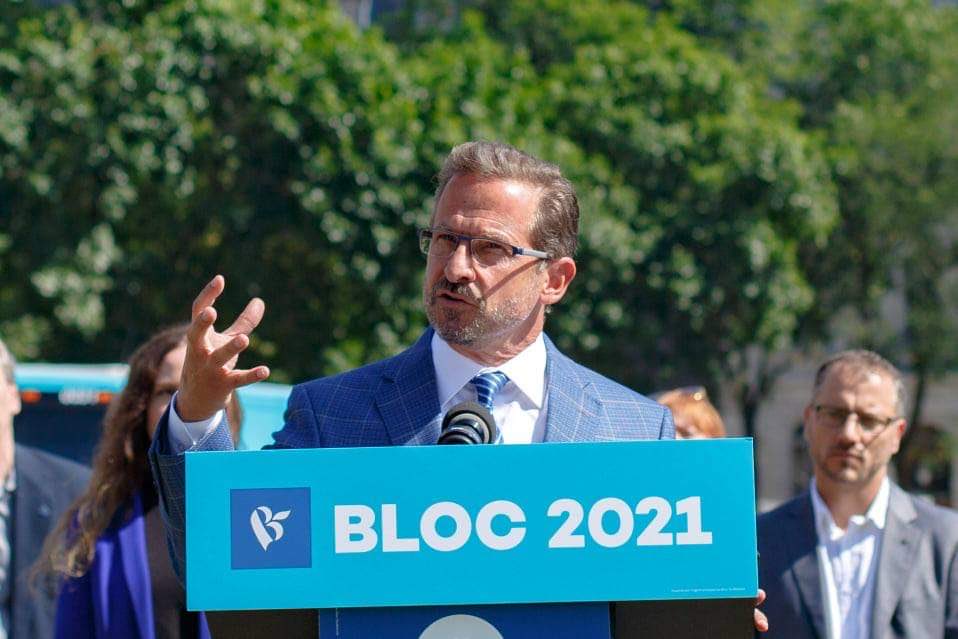How Quebecers Voted: Plus ça change, plus c’est la même chose

Daniel Béland
September 21, 2021
As in October 2019, I spent election night at the Bloc Québécois venue in Montréal to cover the Quebec results for a national television network. Before the Quebec results started to appear on a large screen, many in the room wondered if (and probably hoped that) the Bloc could win many new seats.
This is the case in part because of the reaction to the now-infamous opening question asked by the moderator of the only English-language debate of the campaign to Bloc leader Yves-François Blanchet, who used this moment to turn around his own campaign, which had struggled to gain much traction before that moment. Yet, as the Quebec results started to appear on the big screen, the relatively small crowd (due partly to COVID restrictions) reacted in a rather subdued manner, despite the expected cheers heard when the Bloc won seats.
The tame atmosphere contrasted with the jubilant mood I witnessed in 2019, when Bloc supporters celebrated the return of their party to the front stage. In 2019, the Bloc re-emerged as a powerful force in Quebec federal politics after very disappointing results in the 2011 and 2015 elections and following a period of internal turmoil under leader Martin Ouellet (2017-2018) that almost destroyed the party.
This time, Blanchet wanted to capitalize on the strong reaction against the controversial English-language debate to win many more seats and perhaps reach a “magic number” of 40 seats (out of 78), which he alluded to several times during the campaign. Instead — with the qualifier that mail-in ballots remain un-counted in results across Canada at this writing — the Bloc has not gained more than a couple of seats, with mixed reports at press time that they’ve either maintained their 32 from 2019 or gained two at 34, and the Liberals were able to keep 33 out of their 35 seats in Quebec, including the ones held by prominent cabinet ministers.
Like the maps we see of the results across the country, the federal partisan composition of Quebec in September 2021 looks strikingly similar to the one of October 2019. This is also true when we look at the performance of the NDP, which was able to keep the only seat they had held in the province (incumbent Alexandre Boulerice won easily in his Montreal riding of Rosemont-La Petite-Patrie). The Conservatives ended-up with 10 seats, which is exactly what they got in October 2019.
Although Premier François Legault’s call for a Conservative minority government failed miserably, the premier of Quebec is probably happy that the Liberals did not win of majority of seats, which was his least preferred scenario. Just like Prime Minister Trudeau, Legault lost a gamble, albeit a calculated risk, as he remains a very popular premier among the francophone majority in Quebec. Yet, the failure of Legault’s quasi endorsement of the Conservatives suggests that, when voting at federal elections, many Coalition Avenir Québec (CAQ) voters at the provincial level prefer to support the Bloc or even the Liberals. This is especially the case because Conservatives still struggle to gain traction in Quebec, with or without the support of a popular nationalist premier.
Just like Prime Minister Trudeau, Legault lost a gamble, albeit a calculated risk, as he remains a very popular premier among the francophone majority in Quebec.
Nonetheless, because Legault remains a powerful premier strongly committed to taking on the federal government when needed, it is likely Trudeau will do his best to keep collaborating with the Legault government on issues like child care. As opposed to his father Pierre, who had strong, negative feelings toward Quebec nationalists (even federalists like Robert Bourassa), Justin Trudeau has been able to work with Legault on key files since he became premier in 2018. Although Trudeau will advocate for a strong role for the federal government in the lives of Canadians from all provinces and territories, he is also likely to keep engaging with Legault—a nationalist premier who prefers the Conservatives and their enthusiastic support for decentralization, but who will have no choice but to work with a prime minister whose party (slightly) won the popular vote in his province while sending yet another large cohort of Liberal MPs to Ottawa.
Even if support for sovereignty remains limited right now, Quebec nationalism is here to stay and the push for greater provincial autonomy under the CAQ is unlikely to fade away anytime soon, especially because Legault is likely to remain premier past next year’s provincial elections.
As for Blanchet, he will try to play a major role in the new minority Parliament, and the absence of majority government does give his party a patina of relevance. Yet, the results of these federal elections and the lack of a Bloc wave suggests that he is not the only one on the federal stage who can speak on behalf of Quebecers, as the Liberals will remain in power with a Quebec-based prime minister and many well-known cabinet members from the province, not least of whom Foreign Affairs Minister Marc Garneau, and Official Languages Minister Mélanie Joly.
Overall, these elections have done little to move the parliamentary needle, let alone reshape the political battle to win the hearts and minds of Quebecers, who are not a homogenous bunch willing to simply follow the advice of a popular premier about how to vote at federal elections.
Daniel Béland is Director of the McGill Institute for the Study of Canada and James McGill Professor of Political Science, McGill University.
